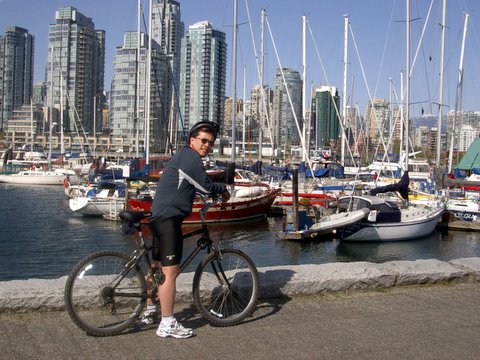The seawall between Stanley Park and the west side beaches provides many miles of fabulous scenery and bike riding opportunities
I believe. Do you believe?
This has been the pressing question that has greeted Canadian television viewers for many months now during the lead up to the 2010 Vancouver Winter Olympics.
What exactly are we supposed to believe? Is this some kind of Olympic rhetoric?
It is natural to be a bit suspicious. After all “believe” statements are usually laden with heavy meaning.
I believe in God.
I believe in you.
I believe in the power of love.
I believe in the Olympics?
Better yet, how about “I believe that sports should play an important role in our lives”.
More specific to the Olympics, “I believe that sports can bring people of diverse backgrounds together.”
Sadly there are many children who do not have the opportunity to take part in sporting events due to their socio-economic backgrounds. There are others who grow up in households where there is no deep interest in sports. These children enter adulthood never fully appreciating the benefits of being active. It can be very challenging to change perspectives later on.
If the Olympics can help to increase our collective enthusiasm for sports, enhance our empathy and understanding of people from other countries and encourage a love of sports in our youth, great gains will have been made from having the games in our community.
To Consider:
How have sports played a role in your life? What inspires you to take part in sports? How did your parents and your community encourage the development of your sports skills?
As an adult/as a family how do you keep sports as a central interest in your lives?
How do you think we can encourage a love of sports in our youth?
To do:
* If you are one of those people who struggle to be active in sports due to poor exposure in your childhood, put your shoes on and go outside. Walking is a form of exercise. Increased stamina from walking supports efforts to take up running or cross country skiing, for example. The more you walk and the more active you become, the more convinced you will be that you can try sports activities.
* Start with sports that are easily accessible such as bike riding, swimming or kicking a soccer ball around a park.
* Show an interest in the sports achievements of your friends. Talk with them about their activities. Support them in their efforts. Their enthusiasm will rub off on you.
* Go easy on yourself. If you are just recovering from an injury, or getting into the swing of things after becoming a mother, it is not the time to tell yourself that you are a lazy sloth because you are not “participacting”.
* Take a hard look at your child’s level of activity. Many children spend a good portion of their days sitting and inactive. Think about how they can become more active – in particular while engaged in a sport. Think about how you can become more active together as a family. What are some of the summer and winter sports favoured in your part of the world? Are your fears that your child might hurt him/herself in a specific sport justified? Are there ways to make accessing a sport easier (in terms of cost and logistics)?
* Watch a variety of sporting events on TV. Expand your horizons beyond hockey, American football/football and sumo. Yearly events include the Tour de France, golf tournaments, and grand slam tennis tournaments, for example.
* Watch local sports teams play. Schools, universities and local non-professional leagues play weekly. Attendance is free and it is often possible to enjoy the game from the sidelines. (For example, watching rugby or cricket on the weekend with the children and dog on hand.)
* Try to attend at least one professional sporting event a year. Be prepared to change your schedule last minute if friends/colleagues have free tickets to pass along.
* Consider supporting a sports charity with your time, talents and/or resources.
The people at Canadian Tire Jump Start programme – a financial support programme – believe that all children should have the chance to take part in sports activities as a way to enhance their life skills, self esteem and confidence.
The Right to Play charity uses sport and play to enhance development in disadvantaged communities.
Related Articles
2010 Winter Olympics: The Family Games
BC Happenings: Taking in the pre Olympic vibes
2010 Winter Olympics: Taking it All in
2010 Winter Olympics: A Virtual Introduction
2010 Winter Olympics: Olympic Line Street Car
Nikki Yanofsky is joined by the Bach Children’s Chorus

